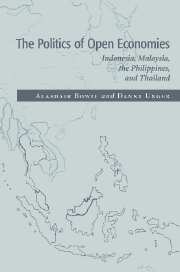6 - Thailand
Published online by Cambridge University Press: 10 November 2009
Summary
Through the early postwar period until the late 1960s, Thai politics remained tightly circumscribed, with top officials of the bureaucracy governing a small and relatively nonintrusive state. Ethnic, geographic, and historical factors enabled these leaders to collect necessary levels of state (and personal) revenue and foreign exchange without launching ambitious state programs or directly mobilizing large segments of Thai society. Strong comparative advantage in rice production allowed officials to garner significant government revenue from the country's leading foreign exchange earner by taxing exports. Steady expansion in land under cultivation produced both revenue and foreign exchange. Exports of commodities grew rapidly and generally without state promotion. As a result, by the 1960s observers were lauding Thailand's “outward-looking” economic growth.
The legacy of conservative fiscal, monetary, and exchange rate policy choices dating back to the nineteenth century exercised a powerful influence on state officials making policy choices in later periods in response to novel external conditions. Nonetheless, by the latter 1960s, inflationary pressures in Thailand increased along with external imbalances. Then, in the mid-1970s, externally induced pressures following the first oil shock and newly mobilized domestic demands for economic redistributive policies began to shift state officials away from their traditional cautious macroeconomic policy orientation. For the first time, political leaders with roots in business began to have strong influence over government policies. During the 1970s and early 1980s, a significant clash emerged among officials and political leaders concerning the country's development strategy.
- Type
- Chapter
- Information
- The Politics of Open EconomiesIndonesia, Malaysia, the Philippines, and Thailand, pp. 129 - 156Publisher: Cambridge University PressPrint publication year: 1997



